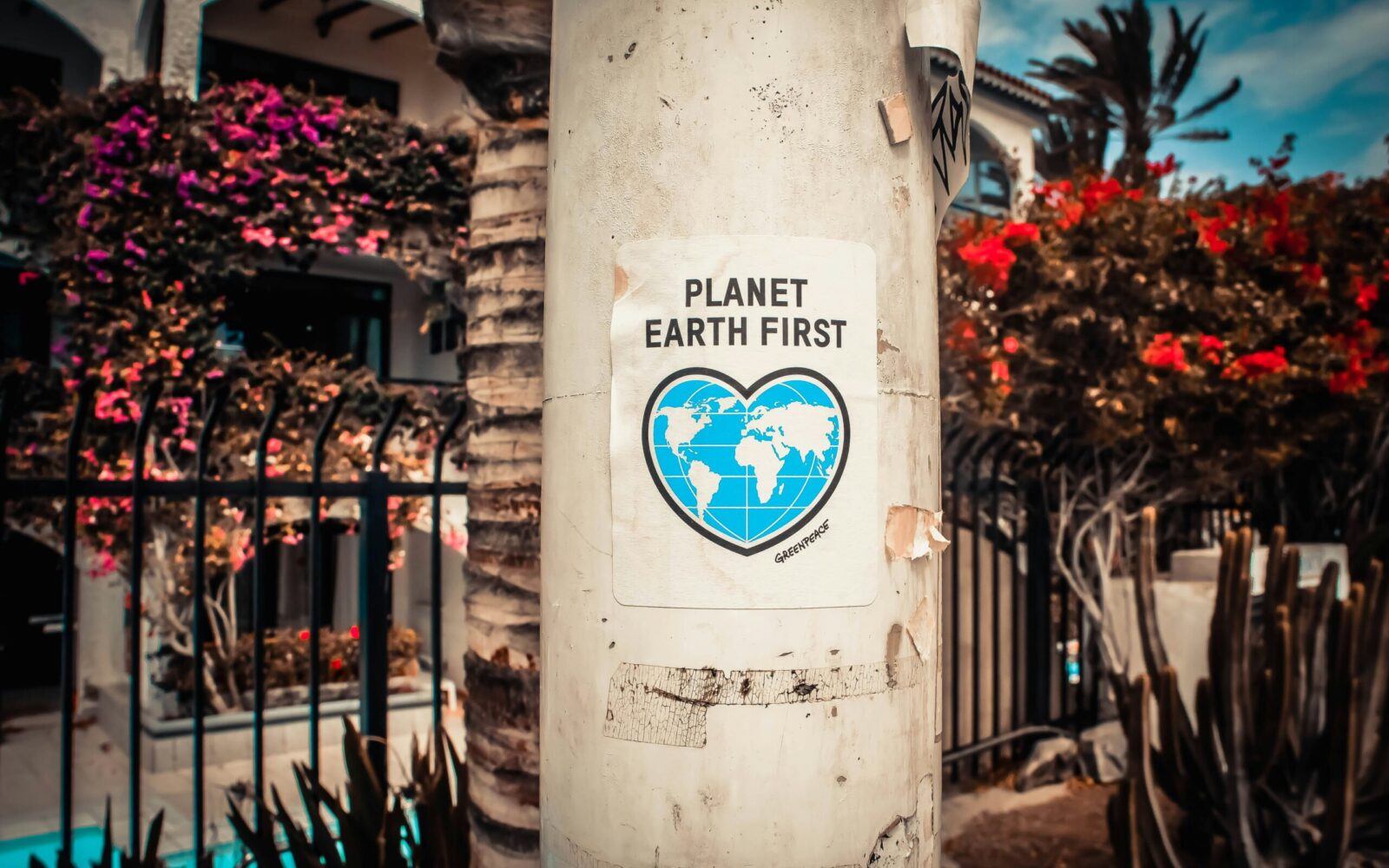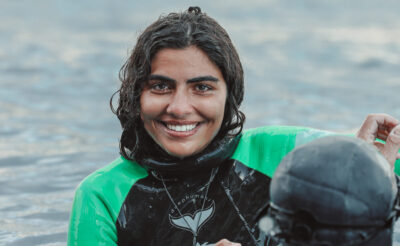From tackling the single-use plastics problem to finding ways to salvage food waste, women are fronting a new wave of sustainable start-ups in the UAE. This Earth Day, MOJEH meets the inspiring women taking small steps to leave a lasting impact on the planet
Palmade
Cutlery created from discarded date palm leaves | Co-founder Lamis Al Hashimy
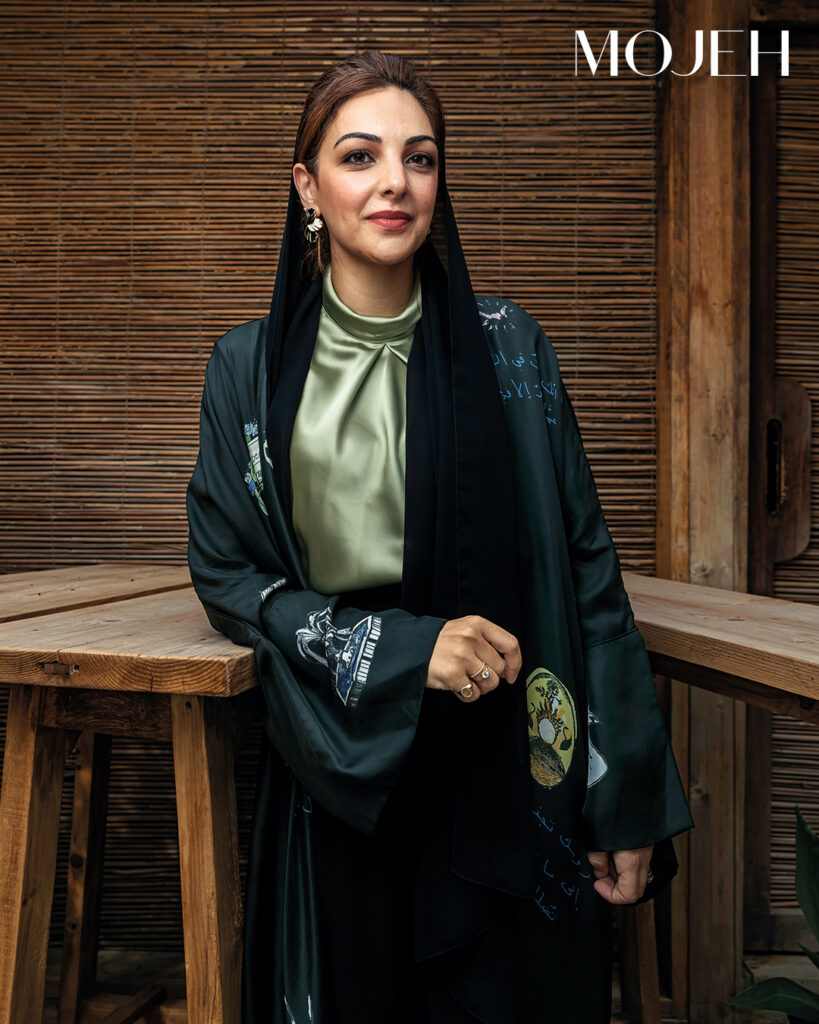
Lamis wears abaya, 1309 Studios and rings, Fyne.
When Lamis Al Hashimy and her husband Yusuf first started experimenting with making their own paper in their garage, it was just a hobby. The couple had travelled to Florence where they were exposed to hand-made paper, and thought it would be a nice activity to try themselves once they were back in Dubai. “My husband had his full-time job, I was taking care of the kids, and this was something on the side that kept us busy,” says Lamis, who previously worked in finance but felt unfulfilled by her job.
They started off by using cotton rags imported from Pakistan, but then set their sights on finding a local resource to utilise instead. “With paper making you usually need to cut down trees or use recycled materials from trees,” Lamis tells MOJEH, explaining that the UAE has two indigenous trees — the date palm tree and the ghaf tree. One day, as she and Yusuf were taking a walk in Jumeirah, they noticed discarded date palm leaves on the pavements. “I grew up seeing this all my life, and it always seemed like green waste — just garbage,” says Lamis. “But on that particular day, we thought, what if we tried to create paper from these? Let’s see what we can make out of them.”
Lamis explains that the date palm tree is a very giving plant by nature. “We’ve all benefitted from its fruit or its shade; in the past Bedouins used it for shelter, and it even has medicinal properties, so I wouldn’t have been surprised to find another way to use it,” she says. They called their gardener and started shredding leaves — and soon enough, were able to make paper.
“We took it to different laboratories to show them that we were able to unlock value from this green waste,” says Lamis. They then figured out a way to combine fibres from the leaves with plant biopolymers — extracts of sugarcane or soybean that act as a glue — to create a material that looks like plastic, but is biodegradable and eco-friendly. “The first thing that came to our minds was, can we turn this little piece of material into a spoon? Because then we could solve the single-use plastic problem we’re all facing, with a local resource,” she says.
By 2018, they had produced biodegradable cutlery crafted from date palm trees, and decided to approach Dubai Expo, viewing it as the ideal launch pad for their project. “It was a great way to enter the market in a safe space where were able to receive constructive feedback,” says Lamis. When Palmade officially entered the B2B market, one of its first partners was Emaar Hotels. “What we’ve seen is when the top-down tone is a sustainable approach then everything falls into place. They were very supportive of switching all their plastics into eco-friendly materials,” says Lamis, adding that Palmade products have also been sold to some restaurants, as well as Spinneys.
The company’s factory produces 70,000 pieces daily, and just launched straws — a timely release, considering the UAE’s recent announcement banning single-use plastic products like straws from January 2025, with the ban extending to plastic tableware a year later. “I feel so blessed being in this country,” says Lamis. “We cannot solve the problem alone, and when you have the government, a very authoritative and substantial body, supporting what you’re doing it gives you inertia to move forward.” Being a mother and leaving a positive legacy for her family is also a key motivator for Lamis, who fondly calls her children “eco warriors” who speak out whenever they see plastic cutlery at restaurants.
She adds that the sustainability industry is a misunderstood space filled with stigmas and stereotypes. Many assume it to be too expensive to incorporate into their lifestyles, or relegate it to the realm of ‘left-wing hippies’. But Lamis and Yusuf now have aims to create products beyond cutlery, and hope that this expansion will help normalise alternatives to single-use plastics. They’ve already teamed up with a sports equipment company to create golf tees, and are exploring the possibility of making hairclips and glasses frames from date palm leaves too. Lamis sees Palmade more as a materials company than a cutlery manufacturer: “We just decided to start with cutlery because it addresses a problem, and it has an impact,” she says.
And that impact, she emphasises, should not be underestimated. “Never shy away from the one step that you take, because it will only lead to a second and a third,” she says. “You become an ambassador and inspire others just by mere action, and it slowly becomes this contagious, collective effort.” Learn more
Kyma
Non-toxic cleaning tablets that dissolve in reusable bottles | Co-founders Farida El Agamy and Samar Sayegh
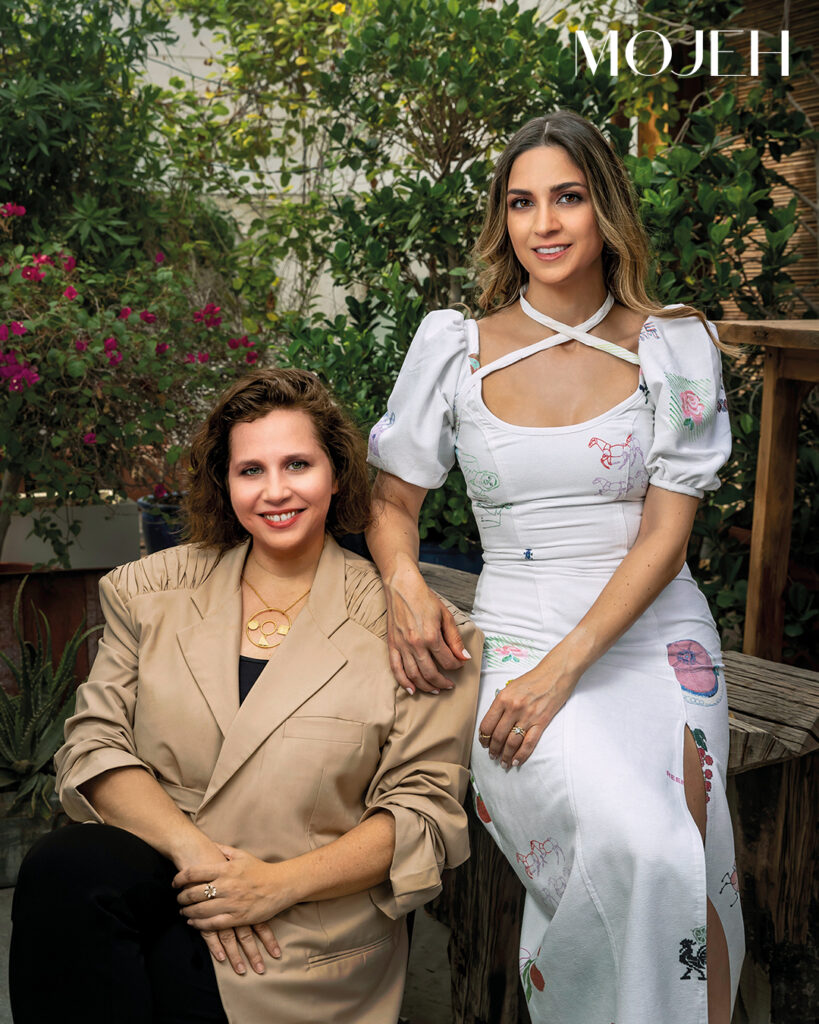
Farida (left) wears blazer, Reemami; necklace, Only Ethikal; ring, Fyne. Samar (right) wears dress, Reemami and rings, Fyne.
When Samar Sayegh and Farida El Agamy walked down the aisle of a mega-supermarket one serendipitous day, they were overwhelmed by the sheer volume of bottles, boxes and sprays in the cleaning aisle. “It felt like a kilometre worth of cleaning products, of all shapes and sizes, and we realised that within a month, all of those plastic bottles will be in a landfill,” Farida tells MOJEH.
Farida runs a non-profit think tank centred on family-owned businesses in the Middle East, and Samar has experience with her family business — National Paints. The two connected 12 years ago, becoming friends before business partners. Then, realising there was a gap in the market for cleaning products that tackle the single-use plastic problem, they co-founded Kyma, a company that creates cleaning tablets that dissolve in water, in reusable bottles. Calling their movement a “refillution”, Samar and Farida have created glass, bathroom and multi-surface cleaner tablets, all of which are non-toxic, biodegradable, cruelty-free and locally made.
Yet even with these clear benefits for the household, and for the environment, Farida says that launching Kyma was a big gamble. “Cleaning is a really traditional, loyalty-driven behaviour,” she says. “It’s also influenced by culture, because you probably clean like your family cleans. What we’re asking you to do is not just use a different product, but also change your consumer behaviour.”
And while customers may be fascinated by the concept, the real goal is turning each client into a long-term one. “You will always sell a novelty product because people find it fun, or it looks cool and funky, so you’ll always make the first sale,” explains Farida, who was more concerned with cultivating repeat customers. She says that a major milestone for the brand was seeing that after three months, those initial clients started ordering refill tablet packs. “So we actually created loyalty in people, and many of them are still with us after two years — their behaviour has changed, which is really encouraging,” she says.
Farida and Samar continue to discover more about the industry they’re disrupting. They recently collaborated with a company that assesses indoor air quality, and offered Kyma’s cleaners for testing. “It came out that because we are water-soluble, the molecules stick to the surface, whereas other cleaning products are airborne, so the toxic ingredients actually stay in the air up to four hours after you clean,” explains Farida. This means that while the surface may be clean, the air is polluted, which can be harmful to people with asthma or pets, who often fall ill from toxic cleaning products. Kyma is currently taking part in a research project where 10 local schools are cleaned over a period of six months, while testing different cleaning brands to determine the effect on the air quality. “Imagine you clean a classroom at six in the morning and the kids come in by eight and there’s still toxicity in the air,” points out Farida. “There’s a lot of concern, and we’re proud our formulation is not just non-toxic, it’s also not airborne — it’s breathable.”
The duo is hopeful not only about Kyma’s future, but also about the more sustainable direction the market is headed in. Samar points out that there has been a shift among start-ups in the region and a thirst for more unity, as a result of the ongoing war in Palestine. “Obviously the last few months have been intense for our region,” says Samar. “There used to be a more competitive way of working , but now we talk about how we can all work together.”
“We’re very proud to be part of this generation of products that are challenging the status quo,” adds Farida, pointing out that the homecare industry has historically remained unchallenged. Taking tiny steps like incorporating more green packaging or reducing the percentage level of toxicity in a product has not brought about significant change. They emphasise that selling an “eco-friendly” formula in plastic packaging isn’t enough, as it doesn’t reject single-use plastics. “We’ve walked on the moon; how come we don’t question these standard ways of doing things, when we know they’re damaging both to our health and also to the planet?” asks Farida.
While there has been demand to take Kyma abroad, in countries from the United States and Poland to Cyprus and India, Samar says that they are focusing on making sure the company has a heavy footprint in its home market first, not only through increasing their retail presence through platforms like Kibsons and stores like Homesmiths, but also through more B2B partnerships. “The affordability angle is something that’s really important to us,” adds Farida. “As long as sustainability is a luxury, it’s not going to change the world — we have to make it accessible to everyone. We all want safe, clean spaces to live in. In my opinion, it’s a human right.” Learn more
The Waste Lab
Soil fertiliser produced from rescued food scraps | Co-founders Ceylan Uren and Lara Hussein
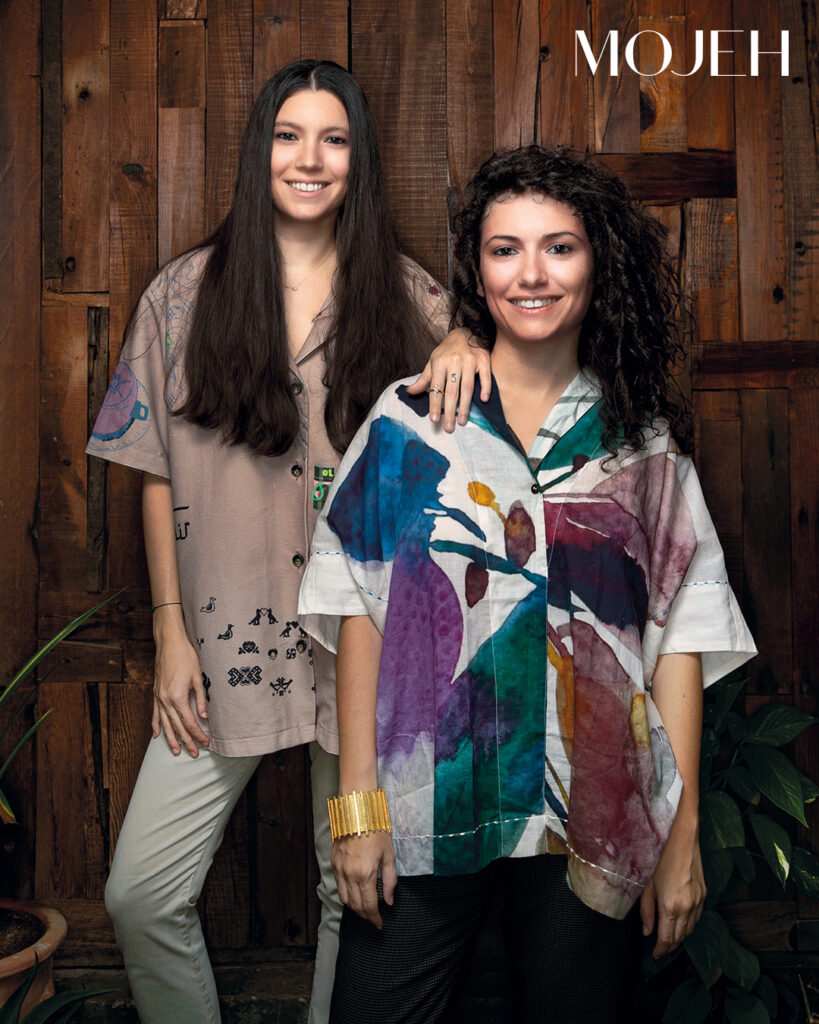
Ceylan (left) wears shirt, Reemami; necklace and ring, Fyne. Lara (right) wears shirt and cuff, Only Ethikal.
During the pandemic lockdown, flatmates Lara Hussein and Ceylan Uren started asking each other big, existential questions about life — like what they could do as individuals to give back to the environment. “We saw one small virus paralyse the whole world, from our lack of respect for nature,” says Lara. She decided to quit her corporate job and Ceylan left her role as an architect, as the two embarked on a new sustainable business venture — one centred on minimising food waste and converting it into an enriching fertiliser for soil.
“I’m from Lebanon and Ceylan is from Turkey — both countries that have beautiful nature and soil,” Lara tells MOJEH. “The UAE is in the middle of the desert, but the desert isn’t dead — there’s soil here, it just needs a bit of TLC.” To get some practical exprience in the world they were about to enter, the duo spent six months in Turkey visiting local farms and learning about composting, before returning to Dubai in 2021 to register The Waste Lab and initiate pilot projects in the community. To source food waste, they began by going from house to house to pick it up, in person.
Today, The Waste Lab works with Hilton and Pullman hotels, Media One and Studio One, along with local restaurants and offices, as well as Expo City events like the recent COP28 climate change conference. When taking on a new client, they first train the kitchen staff on how to properly segregate food scraps — pieces discarded during food preparation (such as peels of fruits and vegetables), and food leftovers, which are post-consumption. These are put into bins, which then get transported to The Waste Lab’s control station in Jebel Ali, where their team manually goes through them to remove any accidental contamination, like stickers or plastics. After that, it goes to their farmland located on the border of Dubai and Abu Dhabi, which accommodates around 17 tonnes of food waste per day. “We harness the power of nature and build compost piles — each can be around one to two tonnes of food waste,” says Lara. These piles are mixed with carbon material, and within six to eight weeks, micro- and macro-organisms have broken down the food waste into compost. Lara says that in the UAE, around 94% of compost is imported. “Why not produce something local, from something we throw away?” she asks. From the resulting compost they produce, a portion is returned to each of The Waste Lab’s clients so that they can continue the cycle of nature. One of the hotels used it to build a rooftop urban garden, and another created an indoor garden installation in its lobby. The remainder is distributed to households within the community, provided to farmers for soil testing and used for further research. The Waste Lab also helps educate the community through school and office compost training sessions. And while some are being introduced to this lifestyle for the first time, Lara says that there are environmentally- aware residents who have long been keen on preserving food scraps and composting, but lack the space and resources to do so.
She also points out that food waste levels in the UAE are high, double the amount of some countries in Europe. “A lot of it comes down to cultural factors — we want to be generous and hospitable here,” she explains, referring to the Middle Eastern habit of hosting large gatherings, often with excess food. The Ministry of Climate Change and Environment and Emirates Foundation are combatting this together through Ne’ma, a food loss and waste reduction initiative that has pledged to reduce food waste in the UAE by 50 per cent by 2030. “They’re working on transforming traditional value systems,” says Lara. “Food is a blessing, you consume enough and you don’t waste it.”
Early on in her journey with The Waste Lab, a mentor from Lara’s university warned her against “wasting her life” in a male-dominated industry. “This actually fuelled me to do it — it gave me motivation rather than making me shrink in my place,” she says. Last year, the company saw an uptick in demand and finally broke even, and what started as a team of two is now 20 members. “Things are moving,” says Lara. “Laws are changing, the government is funding this sector and people are becoming more aware.” Learn more
Read Next: The Sustainable Interior Design Practices To Implement This Earth Day And Beyond
- Words by Hafsa Lodi
- Photographed by Vincent Kenzo at SEVA Experience

